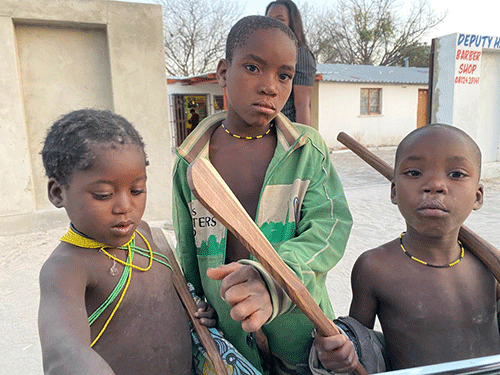OSHIKANGO – While Namibians struggle with unemployment, poverty and inequality, to some jobless Angolans Namibia is a nation of infinite opportunities and employment. These migrants say corruption has destroyed their hope of a better life in their country and they risk life and limb to get to Namibia.
New Era visited a group of about 30 desperate Angolans that have been sleeping rough in the cold as they wait for potential employers to approach them – in Oshikango at the borders of Angola and Namibia.
The group of 12 males and 18 females, of which some are pregnant, walked from Angola to Namibia in search of employment.
“Namibia is a land of endless job opportunities and possibilities. There is no serious hunger and dire poverty. Here people get grants and drought relief when they are in poverty. Back at home if we get food consignments from the government it is by luck,” these are the words of TinTinu Nghuumbwavali from Cuvelai.
Nghuumbwavali said in his home country, there is also skyrocketing corruption which pushes the less privileged into starvation and misery.
“You need to fight tooth and nail to get a simple job such as domestic work,” he said.
“If, for example, you are a teacher in Angola, your family members or children will also study to become teachers because that is the only way they can get employment after their studies. The army was one of the easily accessible jobs but now it’s difficult to get into the army unless you know someone. Those with no skills or proper education like us are left to die,” he narrated.
Nghuumbwavali acknowledges that there are some Namibians also experiencing the same difficulties as them, but he believes “It is
bearable”.
“I would rather settle for this poverty here than the one at home. At least here the government cares about their people.”
Christine Joao (22) from Cahama in Angola said she moved to Namibia to seek for domestic work.
She has walked for about 70km carrying her belongings and her one-month-old baby.
“I know I still didn’t get a job, but I have hope that my employer is not far from finding me,” she said.
Joao was previously been working as a nanny in a village close to Ondangwa but she lost her employer’s number when she left for a holiday in Angola.
“I forgot the name of the village and the paper where I wrote her number got lost, but I am still looking for similar jobs or to work in a salon,” she said.
Joao said they were about 50 migrants but some have already gotten jobs within a short time since they migrated.
The group has camped under a tree alongside the main road.
A normal day entails waking up around 05h00 to seek for food in the dustbins to feed their children.
During the day, they scatter around town to beg for jobs, then in the evening they will return to their camp to rest and see what the following day has in store for them.
Elias Angula (26) needs a job as a cattle herder. He said if he gets a job, he will use the income to provide for his pregnant wife.
He is content with the wages domestic workers get in Namibia.
In Namibia, he said domestic workers get around N$700 to N$1 000 per month and in Angola they get 1 000 kwanzas, which is equivalent to around N$36.
“That is why we prefer to live in Namibia than anywhere else. There is money here that can sustain me and my family,” he said.
Last month, Omusati governor Erginus Endjala told New Era that the number of Angolans flocking to Namibia keeps increasing daily.
Speaking during the Ohangwena state of the region address last month, governor Walde Ndevashiya also commented on the issue, saying the authorities are aware of many Angolans flocking into the country through ungazetted entry points and the matter is being handled.
The economic crisis that has hit Angola since 2014 and the subsequent increase in food prices, combined with the Covid-19 pandemic, and the very low crop yield, have severely impacted the most vulnerable and exposed populations, eroding livelihoods, agricultural production and coping reserves.
With Covid-19 disruptions depriving many of jobs and income, increasing numbers of migrants and asylum-seekers are going hungry.
– ashikololo@nepc.com.na


